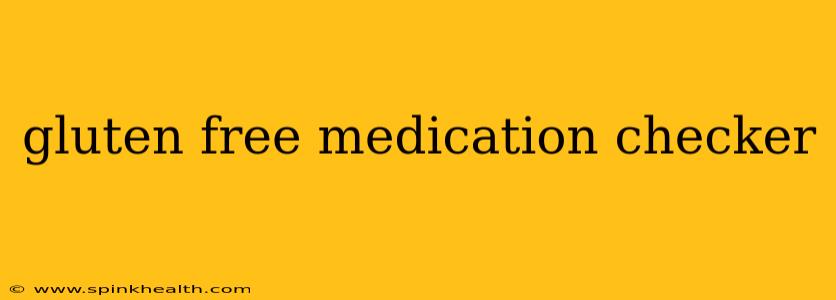Finding the right medication is already stressful enough. Adding the complication of a gluten-free diet can feel overwhelming. But don't worry, you're not alone! Millions of people manage both medication and dietary restrictions every day. This guide will navigate you through the challenges and equip you with the knowledge to confidently manage your gluten-free medication needs.
What Medications Contain Gluten?
This is the million-dollar question, isn't it? The short answer is: it's surprisingly difficult to definitively say. Many medications aren't tested for gluten, meaning the manufacturers don't guarantee its absence. Even if a medication doesn't list gluten as an ingredient, it could still be present as a cross-contaminant during the manufacturing process. This is especially true for medications produced in facilities that also handle gluten-containing products.
The potential for hidden gluten is a significant concern for those with celiac disease or non-celiac gluten sensitivity. Even trace amounts of gluten can trigger debilitating symptoms.
How Can I Check if My Medication Contains Gluten?
Unfortunately, there's no single, foolproof method. Let's explore your options:
1. Checking the Label Carefully:
This is your first line of defense. Scrutinize the ingredient list meticulously. Look for words like "wheat," "barley," "rye," or "malt." Also, pay close attention to any statements regarding manufacturing processes that might indicate cross-contamination risks.
2. Contacting the Manufacturer Directly:
If the label is unclear, or if you have any concerns, reach out to the pharmaceutical company's customer service department. They are the best source for information about the manufacturing process and the potential for gluten contamination. Be prepared to provide the medication's name and batch number.
3. Consulting Your Doctor or Pharmacist:
Your healthcare providers are valuable allies in navigating this complex landscape. They can offer guidance based on your specific needs and medication requirements. They might even be aware of gluten-free alternatives.
Are There Gluten-Free Alternatives to My Medication?
This depends entirely on the specific medication. Some medications are available in different formulations, some might have gluten-free alternatives from different manufacturers, and some simply don't have a gluten-free option. This necessitates open communication with your healthcare provider to explore all possibilities.
What About Medication Capsules and Coatings?
Many medications are encased in capsules or have coatings. These can potentially contain gluten derivatives. Again, contacting the manufacturer for clarification is crucial.
What If I Accidentally Take Gluten-Containing Medication?
If you suspect you've ingested gluten-containing medication, contact your doctor immediately. They can advise you on the appropriate course of action, which may involve monitoring your symptoms and possibly adjusting your treatment plan.
Can I Trust Online Gluten-Free Medication Checkers?
While some websites offer gluten-free medication checkers, exercise caution. Information online may not always be accurate or up-to-date. Always verify information with the manufacturer or your healthcare professional.
The Bottom Line: Proactive Communication is Key
Successfully managing a gluten-free diet while taking medication requires proactive communication and careful vigilance. Don't hesitate to ask questions, contact manufacturers, and collaborate closely with your doctor and pharmacist. By doing so, you can ensure you're receiving the medication you need while maintaining a safe and healthy gluten-free lifestyle. Your well-being depends on it.

